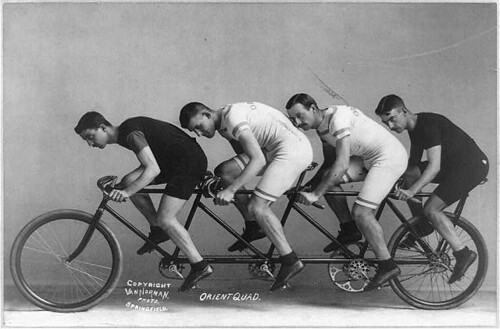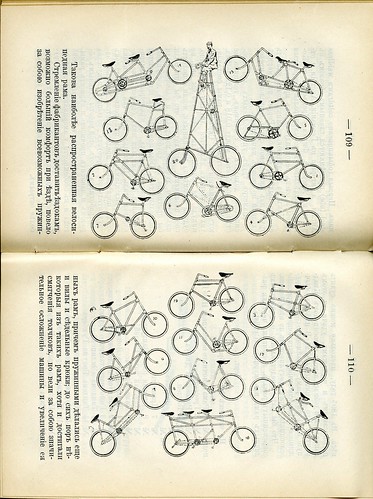I have included here the entire text of the article as published and both illustrations. The text includes some interesting details, such as the "gear" of the bicycles, a number representing the "gear inches" of each, since each bike was a fixed gear bicycle (with only one gear available as ridden). The weights of the riders are also given, and while several of the riders were 150 pounds or less, the winner was surprisingly heavy at 176.
The article is amusingly evangelistic about the different American brands in use by the riders.

ROAD RACE IN JAPAN.In articles that are more than 100 years old, there are often surprises in the language used. I was struck by the sentence, "Kuhn was rather pumped, but Adet was going freely and strong." I was surprised by the usage "rather pumped" - presumably this means the same thing that it would to day? Given the comparison to Adet, who was "going freely and strong" it is hard to tell.
Interesting Account in a Letter from Yokohama—Won on a Rambler.
The following very interesting account of a road race in Japan is taken from a letter to the Gormully & Jeffery Manufacturing Company from Mr. MacArthur, of H. MacArthur & Co., Rambler agents at Yokohama. For the accompanying cuts the Referee is also indebted to the courtesy of the Chicago company. The letter is dated at Yokohama, Feb. 11, and reads in part as follows:
"We advised you not long ago that on the 1st of this month, weather permitting, the first road race, properly organized, ever run in the neighborhood would take place, the course being from Yokohama to Kodza, starting outside the city, a distance of thirty-two miles. February 1 happened to be election day for this prefect, and the police authorities, desiring to do all that was possible to help on the race, desired us to select another day, rather than hamper them with too much responsibility on such a busy day. We, of course, postponed the race, and had it rather on the 8th, Saturday last.
"There were nine competitors, rather we should say entrants, two dropping out, while a third fell out of rank on the morning of the race. The weather was perfect, and the men lined up well. We enclose photo showing the starters. Beginning from the left of the picture, the starters are: H. F. Arthur, on a Dayton, gear 68, rider weighing 162 pounds; E. Adet, on a Rambler, gear 66, rider weighing 176 pounds; H. A. Poole, on a Columbia, gear 70, rider weighing 150 pounds; J. M. Scott, on a Dayton, gear 68, rider weighing 140 pounds; L. W. Eyton, on a Rambler, gear 63, rider weighing 138 pounds. One young fellow, S. S. Kuhn, had been by general consent of the riders allowed five minutes start, and does not appear in the picture. He rode a Crescent. This youngster made remarkably good use of his allowance, and was only collared at Totsuka, about nine miles on his journey, by Adet. Kuhn was rather pumped, but Adet was going freely and strong.
"Arthur got rather the better of the start, but Scott shot ahead in a few yards and Eyton was close on his heels. A mile out Arthur's chain snapped, and he was at once out of the race.
Adet had the worst of the start, but at the first hill pulled up on the others and at Totsuka collared the allowance man, and from then seemed to be having it all his own way, riding freely and increasing his lead, till he had ill luck to collide with a native cart on a small bridge, twenty miles out, the driver of which in his excitement and fear of death from the flying wheel carefully swung the cart across, entirely blocking the bridge. Poor Adet got the buttress at full speed, with the very natural result of a front wheel smashed and the chagrin of knowing that he was no longer in the race. Eight minutes later the advance man was up to him, and in another three Eyton passed still going well and stronger than ever. From this on the race was Eyton's, who won as he liked in 1:58. Kuhn came in at 11:03:15, and Poole took third place, coming in at 11:13.
"Eyton had a serious fall at Totsuka, colliding with the ubiquitous cart and twisting his handlebars. Jamming these against a tree, he got them straight and remounted, never observing that in doing so he bad reversed his front wheel. The whole thing had turned in the bearing, and he continued his ride and won his race, serenely unconscious that aught was amiss with his wheel. A bystander, an expert in wheels, seeing the machine at the finish, declared that it had undergone the severest test a wheel could be put to, and come out unscathed. Formerly he had fancied other wheels, but this experience converted him. This makes the second race this identical wheel has won—there have only been two—the other being two miles on the track, when it had to compete against Columbias and other wheels of 70 gear and over. Adet rode it on that occasion, and won a handsome bronze medal, given by us, as first prize. The prizes on this last race deserve a word or two. The first was a gold medal, value $25, the second a silver, and the third a bronze; all beautifully made and artistically modeled in the best native styles."
It is worthy of note that all the wheels ridden in this race were of American make, there being two Ramblers, two Daytons, one Columbia and one Crescent. The unique and most severe test given to Eyton's wheel after his fall at Totsuka was another notable incident of the race and was a splendid advertisement of the sterling qualities of the Rambler.
Also, the article says that this bicycle race was "the first road race, properly organized, ever run in the neighborhood " - is this supposed to mean that this was the first organized road race in Japan, or more literally in the region of Japan where it took place?








